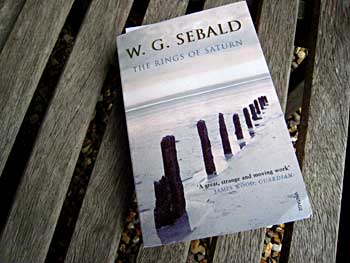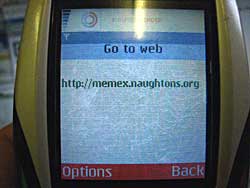
Seen in Tesco St Neots branch.


Seen in Tesco St Neots branch.

I’m reading a truly extraordinary book. It’s the record of a journey on foot through a part of the world that I love – the coast of East Anglia from Suffolk to Norfolk. The author is a German academic who settled in Britain (and taught at the University of East Anglia). He died in 2001.
As he walks through this landscape, Sebald takes his reader on entrancing, serendipitous digressions through history and literature. In Lowestoft, for example, he is reminded of Joseph Conrad, and there then follows an absorbing meditation on Conrad’s life and the experiences which led to The Heart of Darkness — and thence to an equally absorbing digression into the life and death of Roger Casement. (The common link, of course, is the Congo and the brutality of Belgian colonialism which so shocked and horrified both men.) I’m continually astonished by the extent of Sebald’s erudition: his is the best-stocked mind I have ever encountered, with the possible exception of Frank Kermode’s.
I’ve just reached the point where Sebald arrives in Dunwich, a village with an intriguing history.
The Dunwich of the present day is what remains of what was one of the most important ports of Europe in the Middle Ages. There were more than fifty churches, monasteries and convents, and hospitals here; there were shipyards and fortifications and a fisheries and merchant fleet of eighty vessels; and there were dozens of windmills… The parish churches of St James, St Leonard, St Martin, St Bartholomew, St Michael, St Patrick, St Mary, St John, St Peter, St Nicholas and St Felix, one after the other, toppled down the steadily-receding cliff-face and sank in the depths, along with the earth and stone of which the town had been built. All that survived, strange to say, were the walled well-shafts, which, for centuries, freed of what had once enclosed them, rose aloft like the chimney stacks of some subterranean smithy, as various chronicles report, until in due course these symbols of the vanished town also fell down.
Moving on from Dunwich, he meditates on the fact that most of the countryside inland from the coast was once forest, and on the way industrialisation and agriculture gradually deforested Britain – and on how this ‘progress’ is currently being re-enacted in Latin America and the tropics generally.
It is not for nothing that Brazil owes its name to the French word for charcoal. Our spread over the earth was fuelled by reducing the higher species of vegetation to charcoal, by incessantly burning whatever would burn. From the first smouldering taper to the elegant lanterns whose light reverberated around eighteenth-century courtyards and from the mild radiance of these lanterns to the unearthly glow of the sodium lamps that line the Belgian motorways, it has all been combustion. Combustion is the hidden principle behind every artefact we create. The making of a fish-hook, manufacture of a china cup, or production of a television programme, all depend on the same process of combustion. Like our bodies and like our desires, the machines we have devised are possessed of a heart which is slowly reduced to embers…
The only problem with this entrancing book is that it has to come to an end — on page 296. Still, I’m only on page 170 at the moment.

[Clue]
From the New York Times…
BUDAPEST, Oct. 9 — In his first public remarks since quitting last week as chief executive of the Internet phone company Skype, Niklas Zennstrom said Tuesday that he had no regrets about his handling of the company but conceded that he might have tried to squeeze money out of it too quickly.
EBay, the online auction company that paid $2.6 billion for Skype in 2005, said last week that it would take a $1.43 billion charge for the service.
EBay has retained Mr. Zennstrom as Skype’s nonexecutive chairman. Michael van Swaaij, eBay’s chief strategy officer, will fill in as chief executive until a permanent successor is hired.
The write-down was widely seen as a concession that eBay had overpaid for Skype, but Mr. Zennstrom, a Swede who was a co-founder of the company in 2003, defended its value.
In the second quarter, revenue grew 100 percent from a year earlier, to $90 million, and the company recorded a profit in the first quarter, he said.
About 220 million people, most of them outside the United States, are registered with Skype, which uses the Internet to carry phone conversations between personal computers.
“It’s not like it’s been overtaken by Microsoft or Google or Yahoo,” Mr. Zennstrom said at a technology conference here. “Over the longer term, I think it’s going to turn out to be a good business.”
Revenue and earnings projections made by Skype executives before the sale to eBay turned out to be “a bit front-loaded,” he said.
“Sometimes I feel like we tried to monetize too rapidly,” Mr. Zennstrom said.
On Jaiku’s front page this morning.
Wonderful Jaiku users,
Exciting news, Jaiku is joining Google!
While it’s too soon to comment on specific plans, we look forward to working with our new friends at Google over the coming months to expand in ways we hope you’ll find interesting and useful. Our engineers are excited to be working together and enthusiastic developers lead to great innovation. We look forward to accomplishing great things together. In order to focus on innovation instead of scaling, we have decided to close new user sign-ups for now.
But fear not, all our Jaiku services will stay running the way you are used to and you will be able to invite your friends to Jaiku. We have put together a quick Q&A about the acquisition.
Jyri Engeström and Petteri Koponen, Jaiku Founders
Note the formulation: “Jaiku is joining Google”. Touching, isn’t it.
There’s some surprise in the Blogosphere that Google went for Jaiku rather than the market leader, Twitter. Tim O’Reilly, however, isn’t surprised.
Interesting post by Ed Felten…
Last week I spoke on a panel called “The Paradise of Infinite Storage”, at the “Pop [Music] and Policy” conference at McGill University in Montreal. The panel’s title referred to an interesting fact: sometime in the next decade, we’ll see a $100 device that fits in your pocket and holds all of the music ever recorded by humanity.
This is a simple consequence of Moore’s Law which, in one of its variants, holds that the amount of data storage available at a fixed size and price roughly doubles every eighteen months. Extrapolate that trend and, depending on your precise assumptions, you’ll find the magic date falls somewhere between 2011 and 2019. From then on, storage capacity might as well be infinite, at least as far as music is concerned.
This has at least two important consequences. First, it strains even further the economics of the traditional music business. The gap between the number of songs you might want to listen to, and the number you’re willing and able to pay a dollar each to buy, is growing ever wider. In a world of infinite storage you’ll be able to keep around a huge amount of music that is potentially interesting but not worth a dollar (or even a dime) to you yet. So why not pay a flat fee to buy access to everything?
Second, infinite storage will enable new ways of building filesharing technologies, which will be much harder for copyright owners to fight. For example, today’s filesharing systems typically have users search for a desired song by contacting strangers who might have the song, or who might have information about where the song can be found. Copyright owners’ technical attacks against filesharing often target this search feature, trying to disrupt it or to exploit the fact that it involves communication with strangers.
But in a world of infinite storage, no searching is needed…

What’s this? It’s the QR code for Memex.
When I point my suitably-configured (and ancient) Nokia 6600 cameraphone at it, the software reads it, thus:

If I wanted to, I could click and the phone would connect to the site.
Lots of possibilities here. Thanks to Quentin and Michael for their help in getting this working.
Nice column by Stryker McGuire…
Blair’s politics live on most vividly in Brown himself. It’s uncanny the way the new prime minister has both killed Blair and shamelessly assumed his mantle. He’s amassed impressive popular support as the anti-Blair with a serious, nonflashy style that sets him apart from Blair, whose presentational pizzazz came to be deplored as spin by an electorate that turned angry after the invasion of Iraq. And yet, like Blair before him, he’s continued to develop hard-line policies on such issues as immigration and crime. He’s proposed locking up for five years anybody in illegal possession of a gun, for example. Such measures help to tighten Labour’s hold on the political center ground that was so key to the party’s Blair-led landslide in 1997. “It’s very clear that [Brown is] determined to continue being a New Labour politician,” says Blair’s erstwhile ideologist-in-chief, the sociologist Anthony Giddens, former director of the London School of Economics. “You’ve got to grasp the center ground, and his strategy is to squeeze the Tories out toward the edges.”
From The Register…
Proletarian fryhouse McDonald’s has announced it will offer free Wi-Fi in its 1,200 UK burger outlets by the end of the year.
The move will make McDonald’s the country’s largest public hotspot provider, and pits it against Starbucks’ pay-as-you-go T-Mobile service for high street internet supremacy.
It’s all part of a company-wide drive upmarket and away from the traditional McDonald’s experience: scary clowns, mechanically-recovered beef, and screaming infants.
Some sites already had Wi-Fi through an arrangement with BT Openzone, but access was not free. That partnership will continue, but with McDonald’s footing the bill. As part of the expansion, it’s also signed a second deal with The Cloud.
Some 8,000 of McDonald’s 13,000 US chow sheds currently offer free connectivity.
The UK announcement comes days after BT’s launch of BT FON, a Wi-Fi sharing initiative that it hopes will expand its coverage on the cheap. Up to two million Home Hub owners are being targeted and it’ll open to other ISPs’ customers around new year.

These chaps are surrendering to one another. Note decorative shin-pads.